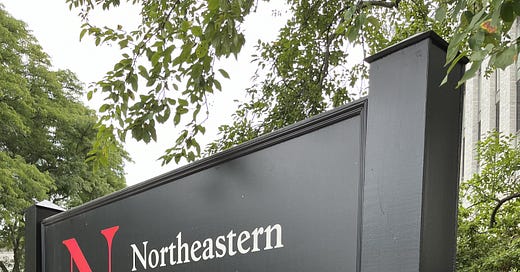Welcome to the inaugural edition of Journalist Brain. Thanks for opening up your inbox to me.
I’m starting this Substack as a place to share what I’m thinking about as I earn my master’s degree. I’m enrolled in Northeastern University’s Media Innovation & Data Communication program within the school of journalism. I’m focusing my work on the “innovation” part, specifically how local TV newsrooms care for the mental wellbeing of their staffs.
To do this, I left my job at Chronicle, a nightly news magazine show airing on WCVB-TV here in Boston. Taking that job in 2022 was a welcome change of pace for me after more than a decade of covering daily news as a newscast producer. It was rewarding to highlight creative, talented, smart people here in New England who were pursuing their passions. Stories I covered in my prior roles often revolved around the most difficult days in a person’s life; Chronicle stories were usually about joyful days.
But I knew I needed a significant change. Telling stories was great, but I wanted to find a way to have a bigger impact on the world of journalism. I wanted to think about the big picture. And I wanted to improve the way we support the mental wellbeing of all of the people who get our news on TV.
The opportunity to explore those ideas came my way via a WCVB colleague, Mike Beaudet. In addition to his work on the 5 Investigates team, he’s also a professor at Northeastern, where he’s leading research into the future of local tv news. I had been following that research for a few years, so when Mike suggested I enroll at Northeastern and work on the project with him, it was easy to say yes.
I’m a few weeks in to my program, and when Fridays roll around my brain is TIRED. It’s the brain version of that good-tired feeling I get after a great weight lifting session: I feel like I’ve pushed myself a little past my previous limits, and now it’s time to rest a little in order to grow.
My classmates are prompting me to think in new and exciting ways. Someone pitched using augmented reality as a contemporary storytelling method for a story about an Ebola outbreak. My reaction: 🤯 Working in my prior newsrooms, I’ve generally felt like one of the innovative thinkers — someone whose eyes are on the future. The past few weeks have made me feel like I’m more Old Media than I realized. I’m excited to have opportunities to imagine what could be possible without the burden of having to figure out how an idea can be executed with current limits on resources and/or technology.
I’m going to be publishing semi-regular updates here about what I’m learning and how I’m synthesizing that with my 15+ years of newsroom experience. I hope to ask a lot of questions and get at least a few answers.
What’s with the name?
Before I wrap up, here’s the story behind the name “Journalist Brain.”
As someone who grew up in the 1990s, the Rachael Leigh Cook PSA about the egg-shattering consequences of heroin use is seared into my brain. That itself is an iteration of this ‘80s PSA:
As you know, I’m interested in how working in local TV news affects the mental health of journalists. Somehow, my mind connected it to this PSA, which made me think, “this is your brain on journalism.” And you can probably see how we got to Journalist Brain from there.1
Finally tonight:2
I’ve done a lot of writing in my career, but none of it was as myself. I appreciate your patience as I get used to sharing from my own perspective.
I would have loved to simply be Lisa Thalhamer dot com, but it can take a minute to get the hang of spelling and pronouncing “Thalhamer,” so sadly that was out. And for reference, it is “tal-hammer” (where “tal” rhymes with “pal”)
A classic way to start the script of the final story in your newscast.








hello Lisa! Thank you for the AR reference 😌. Kudos to you on this!! Love it!